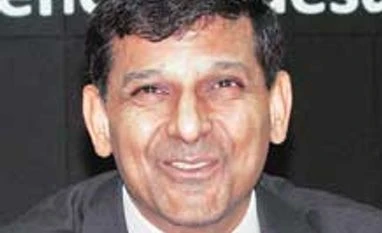Amid speculation about the uneasy relationship between Reserve Bank of India (RBI) Governor Raghuram Rajan and the finance ministry, a leading broking house has added fuel to the fire by saying the governor is seen succeeding International Monetary Fund (IMF) chief executive officer, Christine Lagarde, next year.
"With our sources in Delhi confirming rising friction between the North Block and RBI, with Lagarde's term in IMF drawing to a close in July 2016 and with Rajan's term due for renewal in September 2016, these developments could mean that Rajan might become the IMF's first chief from a developing country," Ambit Capital said in a note to its clients.
Rajan took charge of the central bank in September 2013 and was given a three-year term.
"Will Mr Rajan not want his term to be renewed in September 2016?" the report raised the question, in the context of the monetary policy committee (MPC) which is yet to be formed.
"If the final format that is adopted by India poses risks to RBI's ability to focus on inflation, it could pave the way for the current RBI governor to begin considering alternative career options in September 2016 when his term is due for renewal," the report said.
The MPC, as suggested by the Urjit Patel committee that was set up to review the monetary policy framework, had suggested three of five members from within the RBI (the governor, deputy governor and executive director in charge of monetary policy) but the government seems to have a different view.
The thinking in the finance ministry is that if a majority of the panel members are from RBI, they will not point out any difference of opinion with the governor.
While the central bank has adopted inflation targeting as its primary objective, discussions are still on with the government regarding the formation of the MPC.
"With our sources in Delhi confirming rising friction between the North Block and RBI, with Lagarde's term in IMF drawing to a close in July 2016 and with Rajan's term due for renewal in September 2016, these developments could mean that Rajan might become the IMF's first chief from a developing country," Ambit Capital said in a note to its clients.
Rajan took charge of the central bank in September 2013 and was given a three-year term.
More From This Section
Typically, there is an understanding between the US and the European Union that the former nominates the World Bank chief and the latter the IMF chief.
"Will Mr Rajan not want his term to be renewed in September 2016?" the report raised the question, in the context of the monetary policy committee (MPC) which is yet to be formed.
"If the final format that is adopted by India poses risks to RBI's ability to focus on inflation, it could pave the way for the current RBI governor to begin considering alternative career options in September 2016 when his term is due for renewal," the report said.
The MPC, as suggested by the Urjit Patel committee that was set up to review the monetary policy framework, had suggested three of five members from within the RBI (the governor, deputy governor and executive director in charge of monetary policy) but the government seems to have a different view.
The thinking in the finance ministry is that if a majority of the panel members are from RBI, they will not point out any difference of opinion with the governor.
While the central bank has adopted inflation targeting as its primary objective, discussions are still on with the government regarding the formation of the MPC.
)